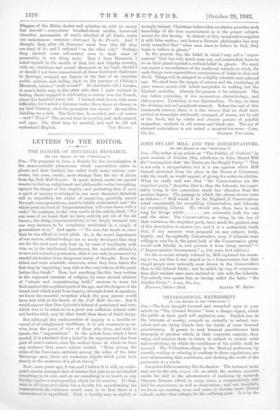LETTERS TO THE EDITOR.
THE DANGER OF PSYCHICAL RESEARCH.
[TO THE EDITOR OF THE "SPECTATOR."]
SIR,—The proposal to form a Society for the investigation of the unaccountable phenomena which superstition refers to ghosts and their kindred, has called forth many curious com- ments, but none, surely, more strange than the cry of alarm from the Pall Mall Gazette. It must, indeed, excite our special wonder to find an enlightened and philosophic writer inveighing against the danger of free inquiry, and protesting that if once a spirit of inquiry is indulged in, our most cherished disbeliefs will be imperilled, the edifice of scepticism, painfully reared through many generations, must be fatally undermined, and " the whole pent-up flood of Supernaturalism will come down with a rush." To continue, in the very words of the article itself, "We can none of LIB boast that we have entirely got rid of the old leaven; the thing [supernaturalism] is too deeply stamped into our very natures, to be completely eradicated in a couple of generations or so." And again :—" No man has hands so clean that he can afford to touch pitch. As, in the moral department of our nature, ethical feelings are so newly developed that they are for the most part only kept up by want of familiarity with vice, so, in the intellectual department, the scientific attitude is Bo new and unfixed a possession, that it can only be preserved by careful abstention from dangerous trains of thought. Even the ablest and most scientific observers, when they have taken the first step by 'inquiring,' may sink to the very bottom of the pond, before they finish." Now, bad anything like this been written in the supposed interests of religion, by some clerical admirer of "simple and unquestioning faith," anxious to warn his flock against the sceptical spirit of the age, and the dangers of the broad road which leads from inquiry, through doubt, to apostacy, we know the scornful reception which the poor parson would have met with at the hands of the Pall Mall Gazette. But it would appear that Don Quixote's helmet of pasteboard and wire, which was to be taken to be a good and sufficient helmet with- out further trial, may fit other heads than those of timid clergy.
But although this condemnation of inquiry is a terrible re- versal of all enlightened traditions, it is not unnatural or un- wise, from the point of view of those who deny, and wish to ignore, the "supernatural." In the article from which I have quoted, it is admitted that a belief in the supernatural has been part of man's nature, since the earliest times of which we have any evidence that man's nature existed. "Even among the relics of the Cave men, certainly among the relics of the later Stone-age men, there are numerous objects which point back clearly to the existence of a ghost theory."
Now, some years ago, it was, and I believe it is still, an undis- puted maxim amongst men of science that just as an eye implied something to be seen, and an ear something to be heard, so any faculty implies a corresponding object for its exercise. If, then, man in all times and places has a faculty for apprehending the supernatural, the inference would seem to be that there is a supernatural to apprehend. Such a faculty may be rightly or wrongly trained. Christians believe that revelation provides such knowledge of the true supernatural as is the proper subject., matter for this faculty. In default of this, imagination supplies! it with false matter; and hence a German philosopher has very truly remarked that "when men cease to believe in God, they begin to believe in ghosts."
In the present day, the belief in what I may call a "super. natural" God has very much gone out, and materialists have to be on their guard against a revived belief in ghosts. We must- not expect a resuscitation of the medis3val miracle or witch, for such things were superstitious excrescences of belief in God and Devil. Things will be adapted to a highly scientific and rational age. We shall have the jargon of science and the vocabulary of pure reason, mixed with beliefs acceptable to nothing but the blindest credulity. Already the process is far advanced. The day before yesterday, it was mesmerism, eleetrobiology, and clairvoyance. Yesterday, it was Spiritualism. To-day, we have the divining-rod and psyahical research. Before the end of this, nineteenth century, there is a fair chance that we shall have. arrived at downright witchcraft, managed, of course, not by aid of the Devil, but by subtle and obscure powers of psychie magnetism, resident in old women and black cats. The cry of alarmed materialism is not raised a moment too soon.—I am,,


































 Previous page
Previous page